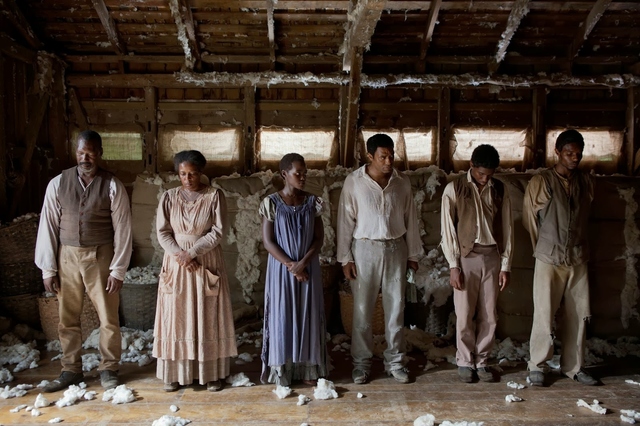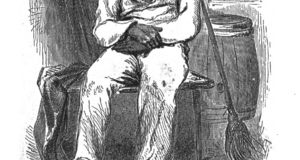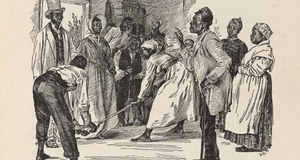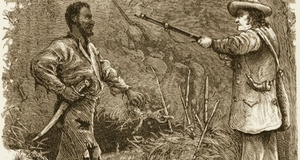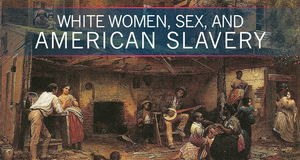Film ReviewReliving American Slavery in 12 Years a Slave
By
2013, Vol. 5 No. 11 | pg. 1/1 As the lights dropped and I sank into my seat, I thought I was ready for 12 Years a Slave, the 2013 film adaptation of Solomon Northup's 1853 slave narrative. I was expecting a movie, a story told with images, music and sound. But, what I witnesssed was testimony, and I was not prepared. In our society of political niceties, few would be. As if for the first time, the film unveiled the simple and uncorrupted evil that was American slavery, the institution we would rather forget but which stalks nevertheless through our nation’s all-too-recent history. The place whereto we are delivered is soul-crushing, a black hole of hatred so virulent as to extinguish any notion of redemption. We bear witness to a reality from which we have been feverishly running: American slavery, in its fundamental brutality, by virtue of its massive scale, and on account of its lengthy tenure, was one of the worst crimes in human history. Yes: as bad as the Holocaust; eviler than the massacres of Rwanda; more terrible than a nuclear bomb or antiquity’s worst wars. We bear witness to a reality from which we have been feverishly running: American slavery, in its fundamental brutality, by virtue of its massive scale, and on account of its lengthy tenure, was one of the worst crimes in human history. Although moral depravity pockmarks the human past like craters of the moon, no systemic evil was ever so deeply institutionalized, codified, and accepted as American slavery. Never for so long, or so recently. And the question that returns to me is this: how do we reconcile this legacy of hatred?In letting slavery flourish on our soil, our nation took on a debt of immeasurable weight—the weight of cruelty, of apathy, of industrial-scale torture—and so far, that debt remains unpaid. The Civil War did not expunge our responsibility for this past, and neither did the civil rights movement, delayed as it was 100 years from the ‘end’ of slavery in America. Nor does the election of a black President divorce us from our national history. Our crimes were severe, and the rift that perpetuates between black and white in our country shows that we are still reeling, though perhaps in denial. Our legacy as the world’s most defiant violator of human rights is not consigned to history, but remains an active undercurrent to our society. In twenty-first century America, it is still true that laws written primarily by white men are used to put primarily black men in prison. We lock-up black Americans at a rate six times higher than we do white Americans,1 a pace so fast that if it continues—and there is nothing to suggest it won’t—one out of every three African-American men will be incarcerated in their lifetime.2 Meanwhile, in the wake of the recent dismantling of the Voting Rights Act, white politicians in southern states are using the laws of our society to further minimize the influence of black voters.3 We remain complicit in perpetuating racial disparities so long as we refuse to address them or acknowledge their deep and painful roots. The economic hangover of American slavery has likewise not yet worn off. After all, the evils of slavery were at their core motivated by economic advantage, and the institution made slave owners rich. But haven’t we leveled the so-called ‘playing field’ after all these years? Yet while today’s average white family has $630,000 in wealth accrued over generations, the average black family has less than one sixth that amount – and the gap is getting bigger, not smaller.4 That’s to say nothing of the drastically different educational opportunities, earning potential, and health outcomes that are still largely determined by the color of our skin. No, the legacy of American slavery is not at all a mere fact of history. The economic hangover of American slavery has not yet worn off. The hatred that formed the lifeless and burned core of American slavery has not yet finished its course. It is still gnawing at the center of our society, its legacy still casting about harm and benefit on no basis but the fatality of our birth. To disown that past, to divorce cause and effect when we look at our nation’s perpetual racial disparities, to ignore the fact that the aftermath of American slavery continues to ripple through our society, is to doom ourselves to a future as morally bereft as our past. And this is why I wasn’t ready for 12 Years a Slave, because as any piece of incriminating evidence does, the film links us to our own terrible past. And it reminds us of a massive debt still unpaid. Like an aging criminal, we want nothing more than to forget, if only so we can sleep at night. But if we want to sleep well, to forget is folly: we must own our past, we must own our national complicity in the things that happened, we must own our failure to deliver justice, and we must own our continuing ties to that legacy. Still spinning the next morning, I found myself paging through the work of Elie Wiesel, the survivor of another horrible crime. He spoke these words upon winning the Nobel Peace Prize in 1986:
Those words are helpful, because they reminded us that just to watch, as Wiesel said, to “bear witness,” is something. And so, let us remember, and let the painful knowledge of our past help us see more clearly the legacy it left behind. Endnotes
Suggested Reading from Inquiries Journal
Inquiries Journal provides undergraduate and graduate students around the world a platform for the wide dissemination of academic work over a range of core disciplines. Representing the work of students from hundreds of institutions around the globe, Inquiries Journal's large database of academic articles is completely free. Learn more | Blog | Submit Latest in Opinion |

